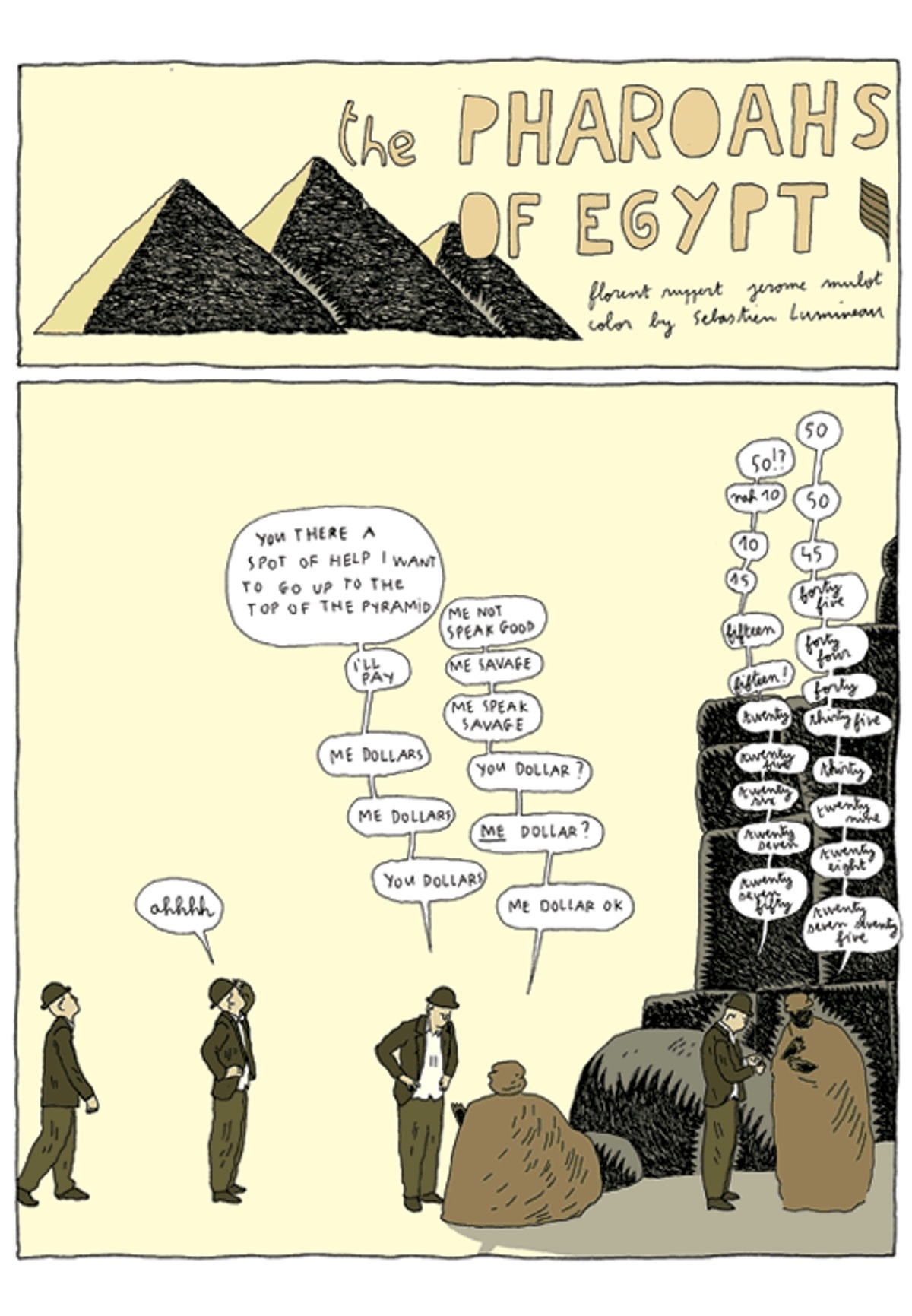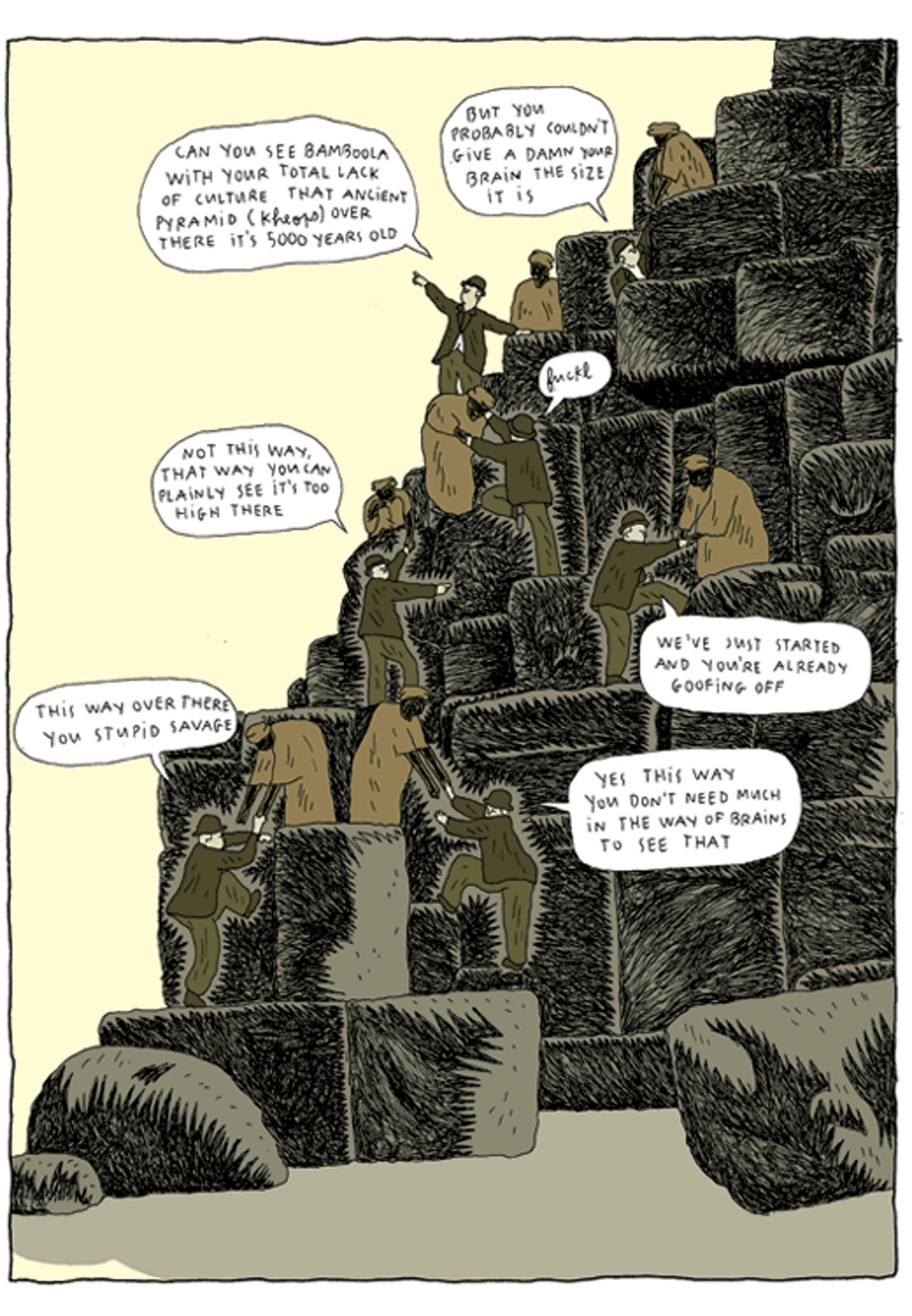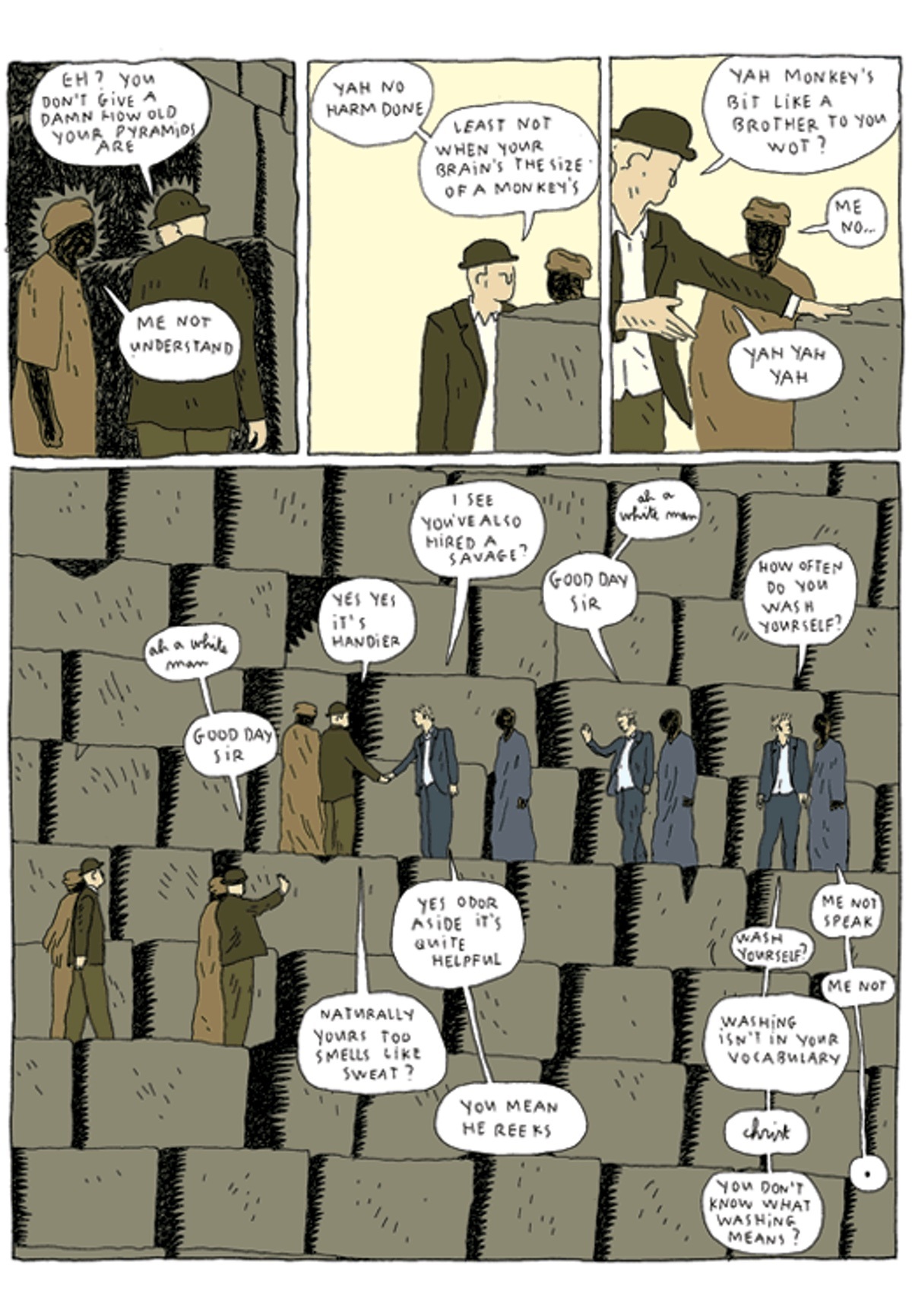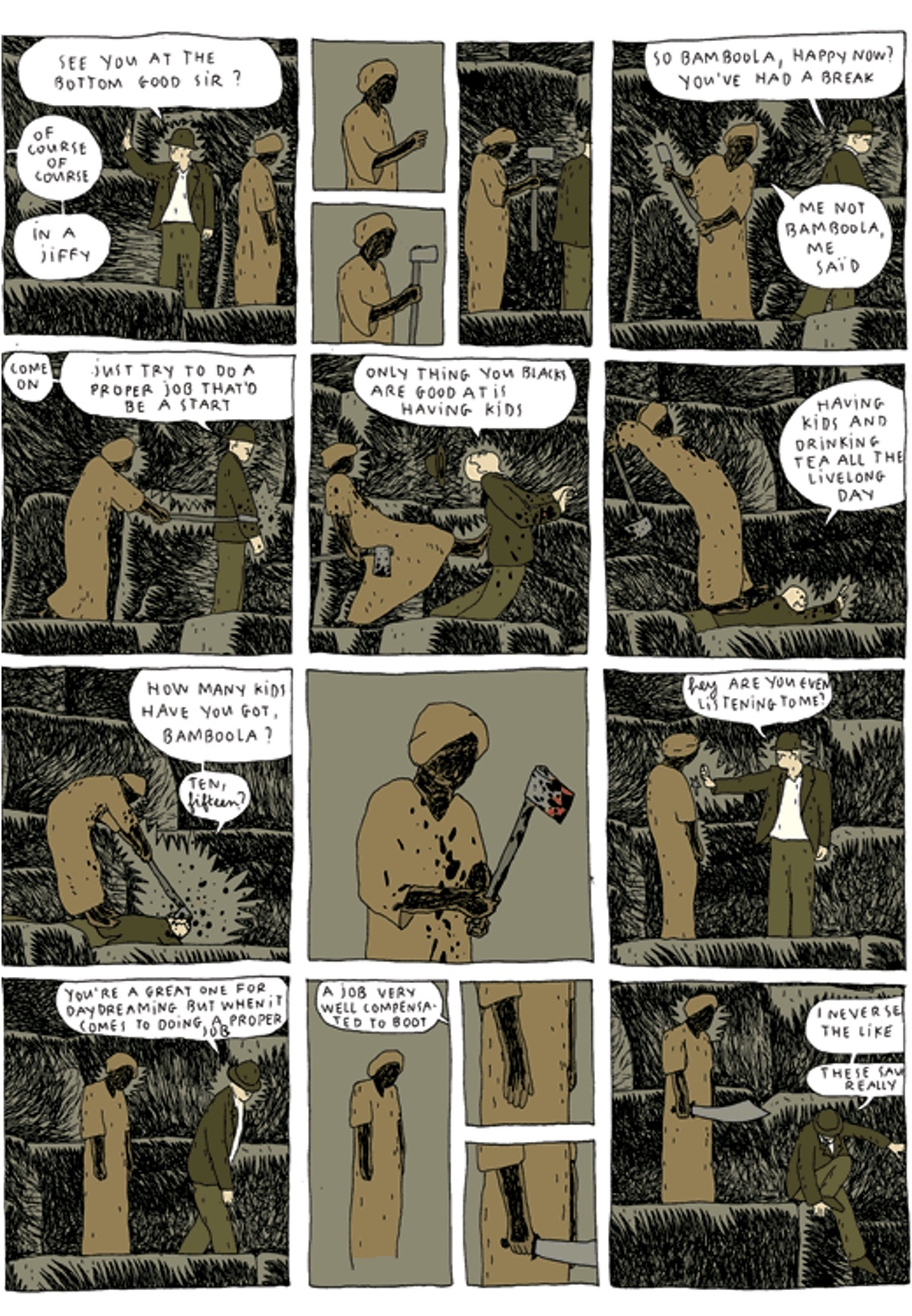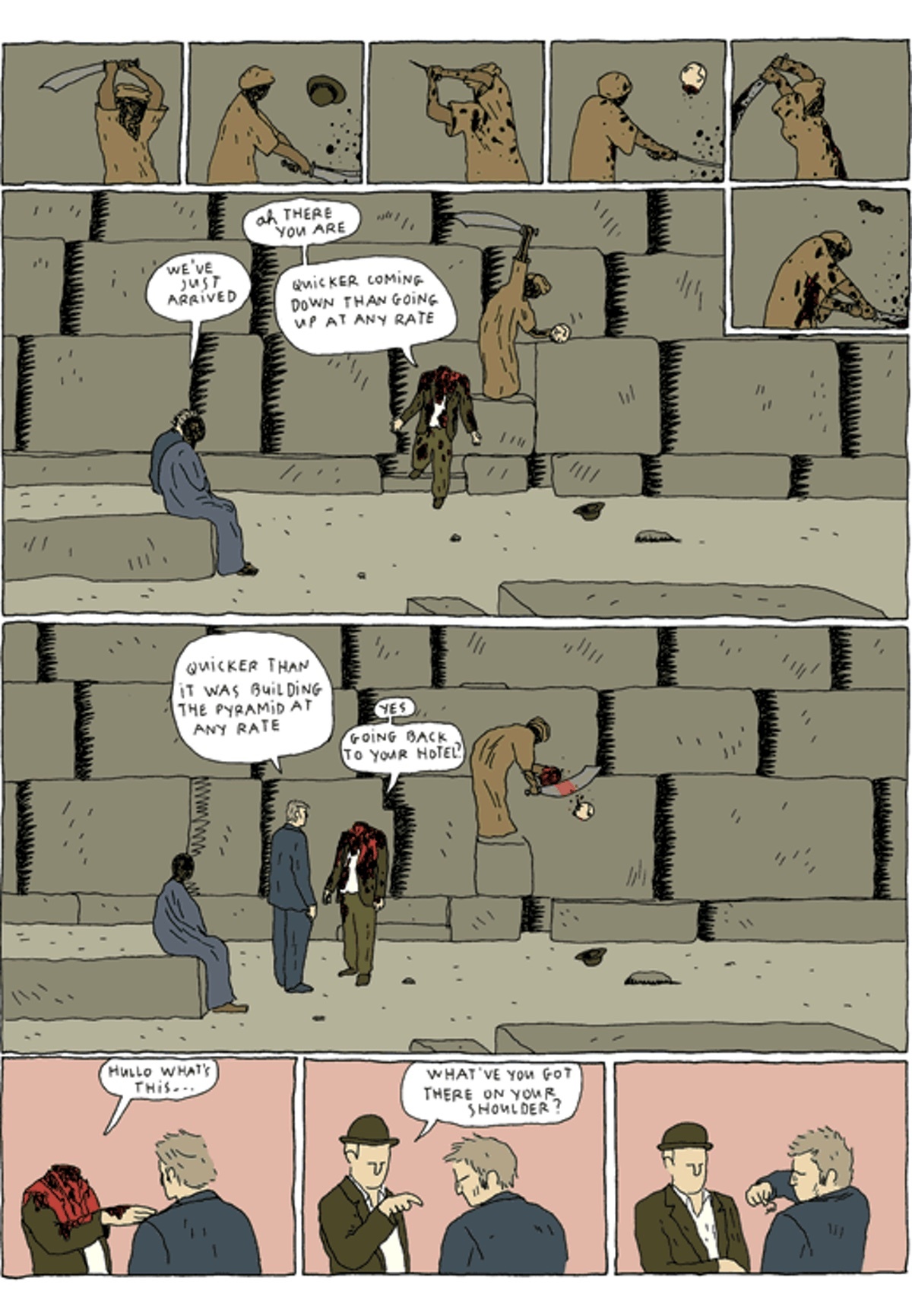The Pharaohs of Egypt by Florent Ruppert and Jerome Mulot, color by Sebastien Lusmineau. Tourist 1: ahhhhh Tourist 2: You there a spot of help I want to go up to the top of the Pyramid Guide 1: Me not speak good Tourist 2: I’ll pay Guide 1: Me savage Tourist 2: Me dollars Guide 1: You dollar? Tourist 2: Me dollars Guide 1: Me dollar? Tourist: You dollars Guide 1: me dollar ok Guide 2: 50 Tourist 3: 50?! Guide 2: 50 Tourist 3: nah 10 Guide 2: 45 Tourist 3: 15 Guide 2: forty five Tourist 3: fifteen Guide 2: forty four Tourist 3: fifteen! Guide 2: forty Tourist 3: twenty Guide 2: thirty five Tourist 3: twenty five Guide 2: thirty Tourist 3: twenty six Guide 2: twenty nine Tourist 3: twenty seven Guide 2: twenty eight Tourist 3: twenty seven fifty Guide 2: twenty seven seventy five
Tourist 1: Can you see Bamboola with your total lack of culture that ancient pyramid (kheops) over there it’s 5000 years old Tourist 2: But you probably couldn’t give a damn your brain the size it is Tourist 3: fuck Tourist 4: Not this way, that way you can plainly see it’s too high there Tourist 5: We’ve just started and you’re already goofing off Tourist 6: This way over there you stupid savage Tourist 7: Yes this way don’t meed much in the way of brains to see that
Tourist: Eh? you don’t give a damn how old your pyramids are Guide: Me not understand Tourist: Yah no harm done, least not when your brain’s the size of a monkey’s Tourist: Yah monkey’s bit like a brother to you wot? Guide: Me no… Tourist: yah yah yah Tourist 1: Ah a white man. Good day sir Tourist 2: I see you’ve also hired a savage? Tourist 3: Yes yes it’s handier Tourist 2: Yes odor aside it’s quite helpful Tourist 3: Naturally yours too smells like sweat? Tourist 2: You mean he reeks Tourist 4: Ah a white man. Good day sir Tourist 5: How often do you wash yourself? Guide: Me not speak Tourist 5: Wash yourself? Guide: Me not Tourist 5: Washing isn’t in your vocabulary, Christ Guide: . Tourist 5: You don’t know what washing means?
Guide 1: Felt like smashing his head in with a rock Guide 2: Plus he’s got an ugly white face but I have a solution to your problem Guide 2: Take his jacket (the easy part) and without him seeing tap it with your cock Guide 1: What? Guide 2: You tap his jacket with your cock Guide 1: Ok Guide 2: That’s it and when he’s talking to you later you’ll know in your mind that you tapped his jacket with your cock Guide 1: Oh I see Guide 2: It’s psychological Guide 1: Yeah yeah Guide 2: Voila Guide 1: Still I wonder if I wouldn’t rather take a hammer to his head Tourist 1: No but the problem is they refuse to learn Tourist 2: hm Tourist 1: These savages just won’t find the means Tourist 2: Hm Tourist 1: That’s the problem Tourist 2: But that’s because they’re too at home with their stupidity Tourist 1: hm Tourist 2: Clearly, they could take advantage of us being there to learn things, develop Tourist 1: but that would take an effort Tourist 2: Clearly Tourist 1: Shiftlessness Tourist 2: To be sure a shiftless lot Tourist 1: To be sure Tourist 2: Shiftless the lot Tourist 1: Yah Tourist 2: Clearly Tourist 1: Shiftless all
Tourist 1: See you at the bottom good sir? Tourist 2: Of course of course in a jiffy Tourist 1: So Bamboola, happy now? You’ve had a break. Guide 1: Me not Bamboola, me Said. Tourist 1: Come on just try to do a proper job that’d be a start Tourist 1: Only thing you blacks are good at is having kids Tourist 1: Having kids and drinking tea all the livelong day Tourist 1: How mnay kids have you got, Bamboola? Ten, fifteen? Tourist: Hey are you even listening to me? Tourist 1: You’re a great one for daydreaming, but when it comes to doing a proper job Tourist: A job very well compensated to boot. Tourist 1: I never se..the link…these sav…really
Tourist 1: Oh there you are Tourist 2: We’ve just arrived. Tourist 1: Quicker coming down than going up at any rate Tourist 2: Quicker than it was building the pyramid at any rate. Tourist 1: Yes, going back to the hotel? Tourist 1: Hullo, what’s this…. Tourist 1: What’ve you got there on your shoulder?







